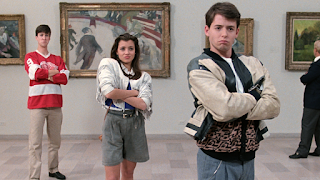"It's my job as director of a comedy to set up the joke. I'm a Jew. If I hear an anti-Semitic joke from a stranger, I'm offended and outraged. If a close friend or relative tells me the same joke, I'm laughing. The joke hasn't changed, just my perception of how the joke is being presented. That's how directing comedy works. If I set it up properly, it works."
It is very interesting to dwell upon his observation as it is very true, at what point does something stop being comedic and start being offensive.
As an example of this I raise to you Robert Downey Jr's Oscar nominated role in Tropic Thunder (as pictured above), for those who don't know, he is a white man usually, so why then is this considered to be comedic genius and not 'blackface' which is definitely not okay? It's the set up of the gag, because the character is also a white man who has a 'pigment changing operation' to make him stereotypically African American, so instead of just an offensive stereotype we have a commentary on society which is actually very funny and is rightly praised. So then the key to comedy is the set up? Well, yes it is one of the keys, but there are other things that will see a joke or gag fall flat if they aren't executed correctly.
Upon further research, the other key aspect is pacing, this can be firstly to give the audience time to laugh, as if you cram too many jokes too quickly the audience may miss some from laughing at the others (perhaps that's ambitious to assume your film is already funny enough to achieve that) the other thing is that if you have a big laugh this will more often than not require a big build up. Then there is also what I'd like to refer as attritional comedy and pacing.
I think to Hail, Caeser's 'Would that it were so simple' scene which executes perfectly (in my opinion) both a big pay off from a long build up but also and probably more so, attritional comedy. It quite literally wears you down with the same monotony until it is funny (and it is funny, I am not criticising the scene). This is because it gives a long amount of time for you to begin to feel the awkwardness of the characters and laugh from an outside view, mostly at their strife and discomfort. Then we have the 'it's complicated line' which in essence plays the role of the pay off, to see all that struggle for nothing and for the director to have given up is funny to an audience, it is the big pay off.
Moving somewhat away from the jokes themselves and looking more narratively I also found and consolidated with my own film knowledge that, great comedy has almost always got great drama at its core. Upon reading this I decided to think about my favourite comedy films, to name a few, The Big Lebowski, In Bruges and something a bit more lighthearted in Ferris Bueller's Day Off. All fantastic films, all (in my and many's opinion) hilarious and yet all with strong narratives at their core. In Bruges deals with the idea of death and suicide and features some very complex characters, Big Lebowski has a very complex plot that follows one person in a maze of plot lines and character groups with the Dude (the protagonist) being so larger than life that we can't help but love him. And Ferris Bueller's Day Off, perhaps the least complex or deep of the three but nonetheless it still gives us a narrative that we get sucked into and it gives us characters we feel emotion for.
So, I have hopefully made my point that good drama makes (or can make) good comedy, but why? Well you see, if we don't care about the characters we can laugh at the situations and the slapstick, they can still be funny. But if you give us characters we love and put them in drama, it makes the comedic relief all the more satisfying. This is particularly effective with the black comedy style of In Bruges, a particular thread comes to mind of Ray (played by Colin Farrell) getting put back into the fray of the film because of a seemingly throwaway scene where he fights a Canadian in a bar, the comedy is made more funny by the consequences of it, sure the fight is funny in a slapstick kind of way and he says a pretty funny line when the Canadian goes down, but the real comedy comes when it comes back to bite him in the actual plot. In the same way that a series of good set pieces can make an okay drama film, the same for comedy, a series of single moments can make a good comedy film, but the best is when the jokes have meaning and play upon the narrative to a degree.


No comments:
Post a Comment